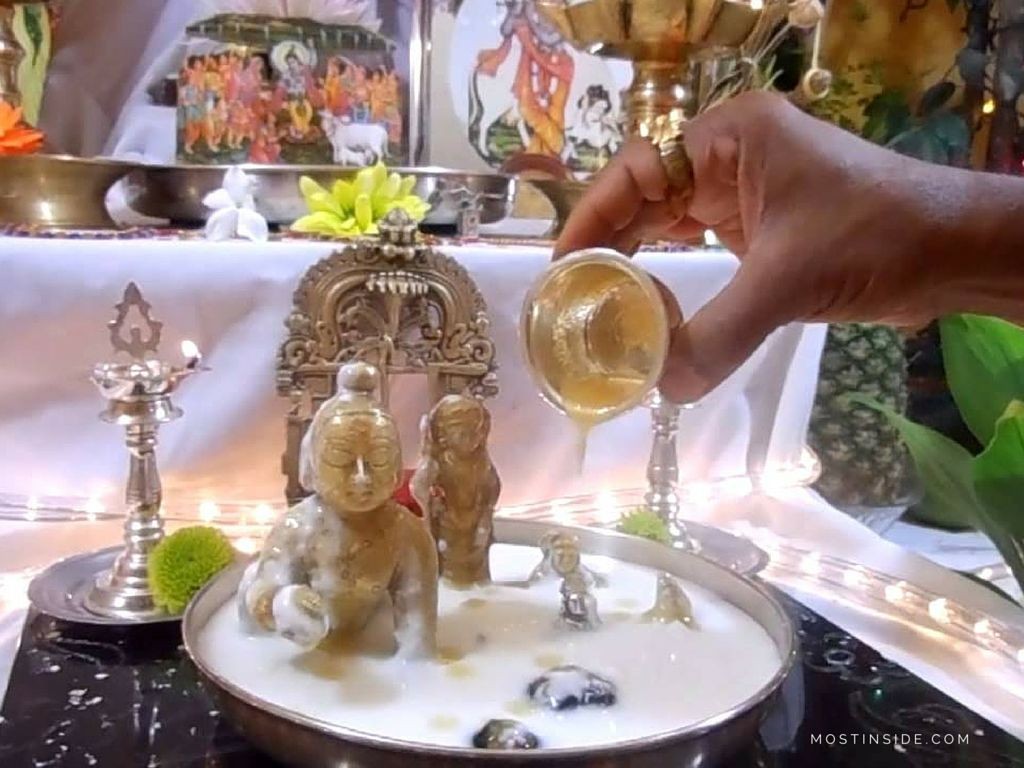Importance of Abhishekam In Hindu Religion
This post was last updated on January 7th, 2025

Hinduism is known to be the oldest religion in the world and it encompasses broad range of religious philosophies, cosmology, recognisable rituals, visits to important pilgrimage shrines and shared textual resources.
As per the widely accepted perception, Hinduism is a religion which comprises of about 33 crore deities owing to the diverse cultures, traditions, mythological beliefs, etc accepted across the 29 states and 7 union territories of India.
Being Hindus, we believe in visiting the temples for offering our prayers, sharing our problems with our deity and to gain peaceful life in return. Since there are huge number of deities, the procedure of performing puja is different in different parts of the country. Amidst versatility in terms of rituals followed in Hindu culture, there is one such ritual called the abhishekam that is performed in temples on daily basis or devotees perform it in their houses or visit the temples to perform it.
Abhishekam is basically a ritual of presenting the God and Goddesses with panchamrutam, which is a mixture of milk, clarified butter, curd, honey and sugar/ sugar-cane juice. It is a way of offering or bathing the idol with such rich ingredients that are sign of purity. Cow is a sacred Hindu animal that is said to present all the 33 crore God and Goddesses. Hindus believe in worshipping the cow and therefore, the main ingredients of this panchamrutam is derived from cow.
In case when a temple is being made, the idol of the God or Goddess receives it final shape on an auspicious day as per the Hindu calendar and then prana prathishtapana takes place. The priests place Navrathnas under the seating of the idol and after performing several homa and chanting several mantras, they place the idol inside the garbha guddi. Till the next 48 days, the homa is regularly conducted and owing to the sacred fire, the garbha guddi becomes extremely hot. In order to cool down the temperature of the temple and to purify the whole ambience, the abhishekam is performed. Devotees come in large numbers to watch the ritual being performed and to receive the prasadam in the form of thirtham or panchamrutam.
This thirtham is said to purify one’s soul and it is a sign of God’s blessing. In scientific studies, it has been found that the ingredients used in this panchamrutam actually helps in removal of toxins from the body. Since India is abundant in diversity, you can really witness this diversity in the abhishekam performed in different places.
Some of the most prevalent forms of abhishekam are listed below:
1. Kumkuma/ Sindoor Abhishekam
Kumkuma is a red coloured powder that is used for religious markings in Hinduism. This sacred powder is generally made by mixing turmeric powder with a bit of slaked lime, that gives it a ravishing red colour. This kumkuma abhishekam is performed on all Gods and Goddesses as a symbol of offering whole hearted prayers to God by smearing His/ Her idol with this holy powder. In case of Goddesses’ idol, many temples offer sindoor abhishekam, a holy red or orange coloured powder wore by married females in Hinduism.
2. Haldi Abhishekam
Haldi or turmeric holds an auspicious position in the Hindu rituals and this is why, the robes of Hindu monks are generally coloured with yellow dye made of turmeric. Due to its yellow-orange colour, turmeric is said to represent the sun, whose presence is said to alleviate the sanctity of any Hindu ritual. Therefore, turmeric is mixed in water and poured on the idol to give the God, a sacred bath and to offer sun God’s blessings to devotees. Haldi is used in many Ayurvedic medicines since ancient times and is useful in building immunity level. This abhishekam is done to seek God’s help in attaining and maintaining best of health at all times.
3. Milk Abhishekam
Milk is known as the purest and highest form of offering that can be made to God as it is obtained from the holy cow. Since milk is great for strengthening internal body and to provides us with essential nutrients to enjoy best of health inside and outside, we offer milk abhishekam to the idol to bath God with a rich ingredient that is pure and nutritious.
4. Curd Abhishekam
The milk abhishekam is generally followed by the curd abhishekam. Since it is an indispensable part of the panchamrutam, the curd is used to symbolise that the nutrients in this super food that is made from cow’s milk wards off diseases and gives you a healthy body and purifies your mind and soul. The curd abhishekam is yet another way to please the God for having great health and some people even believe that women who perform this abhishekam are blessed with healthy children.
5. Honey Abhishekam
Also a part of panchamrutam is honey, which is popular is a cleansing and purifying agent. As it is endowed with a natural sweet taste, the honey abhishekam is performed to please God to bless everyone with sweet tone and to ward off all feelings of hatred from people’s heart.
6. Sugar Abhishekam
Sugar or sugar-cane juice is widely used to make panchamrutam and after honey, it is sugar abhishekam that is performed to pray the God for blessing everyone with great health, clean soul and productive minds. It is believed that the sugar abhishekam is done to eliminate the negative vibes from the soul.
7. Tender Coconut Water Abhishekam
Tender coconut water is itself a gift of God and by pouring it on the idol, the priests on behalf of the devotees, asks God to help people be contented with their lives and not to indulge in greediness.
8. Dry Fruits & Banana Abhishekam
The whole banana plant is known for its sacredness and this is why banana leaves, stem and fruit is widely used in many pujas. After offering the panchamrutam, banana fruit cut in small slices are offered to God and then it is distributed as a God’s blessing in the form of prasadam. Dry fruits are also offered to God in many places to bless everyone with increased strength to fight diseases and to help everyone stay away from the worldly desires.
9. Water Abhishekam
At the end, the priest brings holy water from the well or a clean water source and offers as abhishekam to the idol to clean it thoroughly. This is performed to please God for complete purification of soul so that we remain as pure as water under the supreme guidance of God. In some places, the water abhishekam is performed both at the beginning and end.
Recommended For You
Essential Lessons of Life to Learn from Bhagavad Gita
Snehashree Bhat
A young writer who loves to pen words from creative perspective. Passionate internet surfer, a versatile homemaker and a person who finds pleasure in adopting healthier and positive changes in her persona. An enthusiastic feminist who wishes to make serious changes in the stereotypical thought process of the society via the voice of her words.




